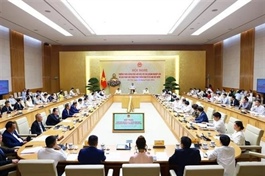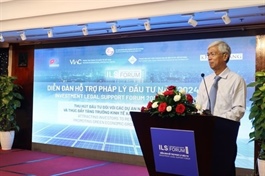Investment law revisions to increase decentralisation
Investment law revisions to increase decentralisation
A draft to amend four existing investment-related laws is expected to create much stronger conditions for drawing in new investment capital.

The Ministry of Planning and Investment (MPI) is preparing draft amendments to laws on planning, investment, public-private partnerships (PPP) investment, and bidding. The draft amendments are currently open for feedback and proposals from the business community before being submitted to the National Assembly (NA) for consideration.
During a seminar held last week in Ho Chi Minh City, which gathered opinions from provinces and cities in the Southeast and Mekong Delta regions, Deputy Minister of Planning and Investment Nguyen Thi Bich Ngoc said that the process of implementing relevant policies had exposed various inadequacies, creating challenges for businesses.
“The MPI has reviewed and submitted to the government a proposal to amend and supplement several articles of these laws to address implementation issues,” Ngoc said. “The revisions aim to remove obstacles in planning, investment, production, and business activities, ultimately promoting economic growth.”
Key changes include decentralising the approval of funding policies to provincial people’s committees, establishing investment support funds, and revising regulations for terminating ventures. In addition, special procedures will be introduced for projects in sectors deemed a priority for funding attraction.
The Law on Planning will be revised to strengthen the national planning system, while avoiding overlap between provincial and urban/rural planning. The amendments will also promote decentralisation and simplify processes.
To encourage public-private collaboration, the PPP law will also be amended, expanding the scope of sectors, forms, and methods for implementing related projects. It will also refine the financial mechanisms for such schemes. The MPI has proposed simplifying procedures, enhancing decentralisation of state management for PPP projects, and addressing challenges faced by transitional build-operate-transfer and build-transfer initiatives.
For the Law on Bidding, the MPI has suggested streamlining regulations to save time and accelerate the implementation of bidding packages. Additionally, the draft proposes adding new categories that allow for contractor selection in special cases, and decentralising authority to expedite implementation.
Localities have expressed broad support for the policy of separating site clearance compensation in public investment projects into independent ones, as a way to accelerate progress. The draft outlines situations where compensation, support, resettlement, and site clearance can be separated into independent projects, particularly for important national ones considered by the NA. For some smaller initiatives, decisions will be made by relevant authorities.
Nguyen Truc Son, Vice Chairman of Ben Tre People’s Committee, praised the innovative approach and openness in the draft revisions to the investment law.
“Allowing the separation of compensation, site clearance, and resettlement is a reasonable move, removing obstacles for localities during implementation. Priority should be given to small-scale Group A, B, and C projects, with flexibility depending on the situation,” Son said.
Le Hoang Anh, a standing member of the NA’s Finance and Budget Committee, emphasised the importance of timely development of the revised laws while ensuring their quality when submitted for approval at the upcoming session in October.
“We have encountered problems with the slow disbursement of official development assistance and domestic capital. Each phase of a project often involves multiple laws. Therefore, I hope that the MPI and localities will thoroughly review all challenges and overlaps when drafting them to ensure synchronised solutions,” Anh said.
Anh also highlighted the importance of carefully considering technical and policy solutions when developing regulations related to separating compensation for site clearance, to avoid unintended consequences.























